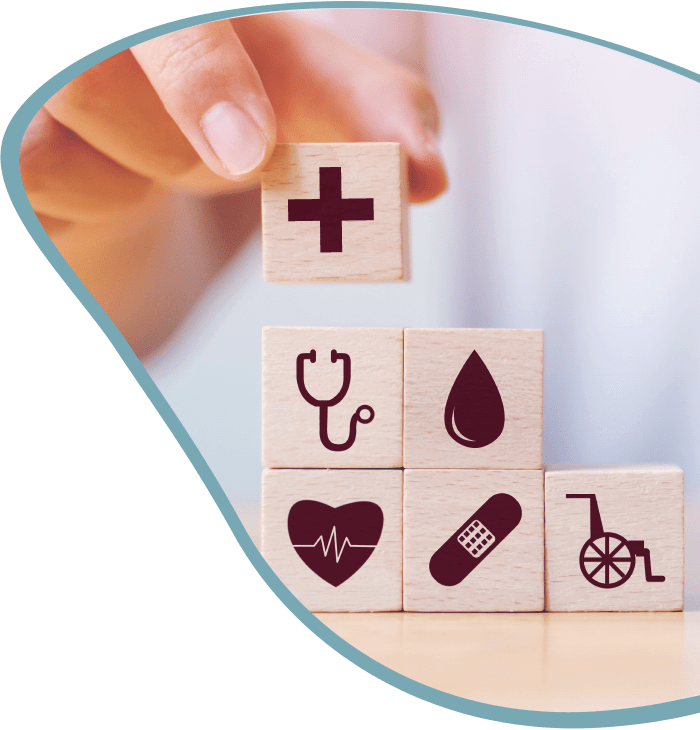
Everything you need to know
Do you have questions about kidney function?
How do our kidneys work
Every organism needs energy and this energy comes from a series of reactions that take place inside cells. The ingredients necessary to produce energy are contained in the food we consume every day.
Apart from energy production, these chemical reactions also release useful, as well as harmful (toxic) substances, which must be retained or discharged respectively.
The kidney is primarily responsible for this process, so it may be described as the body’s "filter".
How many kidneys do i have
The human body has two kidneys that have the shape of a bean. They are located just below the rib cage in the rear part of the peritoneal cavity.
Their main function is to maintain homeostasis with regard to water, electrolytes (such as potassium, sodium, calcium, phosphorus and magnesium), acid-base balance (PH, CO2, HCO3) and many other solutes (such as urea, creatinine, glucose, amino acids, albumins).
Kidneys produce hormones (renin, vitamin D, erythropoietin, prostaglandins) and process hormones (vasopressin, aldosterone, atrial natriuretic peptide, parathyroid hormone).
Kidneys influence and are influenced by almost all systems of the body.
Diseases, such as hypertension, diabetes, rheumatoid arthritis, systemic lupus erythematosus, vasculitis, some hereditary diseases, as well as certain drugs (antibiotics, anti-inflammatories) and normal conditions, such as pregnancy, may affect the structure and function of kidneys.
What happens when kidneys stop functioning and what is renal failure
Renal function disorders are roughly divided into two main categories; reversible and irreversible.
The first category can lead to acute renal failure and the second to chronic renal failure.
A number of people who suffer from chronic kidney disease will be ultimately subjected to extra-renal support, such as periodic hemodialysis or peritoneal dialysis or kidney transplantation.
There are many causes that can lead to acute renal failure. These may either be prerenal (dehydration, reduced blood flow to the kidney), intrinsic (obstruction of the renal artery or vein, glomerulonephritis, endogenous-exogenous toxins, intrarenal obstruction, intrarenal vascular disease), or postrenal (obstruction of the urinary tract, such as tumors, lithiasis).
When the overall renal function is not restored following an episode of acute renal failure within a period of 6 months, then the patient develops chronic renal failure.
Renal disorders lead to various problems, sometimes life-threatening, that result from hyperkalemia, metabolic acidosis and pulmonary edema.
The uremic syndrome refers to the complications of chronic renal failure.
Some of the complications of renal failure are anemia, dehydration, itching, dry skin, skin pigmentation, nausea, vomiting, anorexia, bone disease, libido disorders, impotence, fatigue, confusion, asterixis, seizures, peripheral neuropathy, myopathy, coma, hypertension, pericardial effusion, peripheral edema, sleep disorders, restless legs, muscle cramps, anxiety, depression, and susceptibility to infections. Early diagnosis increases the chance of avoiding serious and life-threatening complications.
What are the signs - symptoms of renal failure
Healthy kidneys perform three basic functions:
1. They remove toxins from the blood through urine production.
2. They regulate the levels of fluids and electrolytes that are essential to the body.
3. They have an endocrine function that involves hormone production.
Chronic renal failure is the progressive and irreversible loss of kidney function.
Chronic kidney disease is divided into five stages:
- Stage 1: renal failure with normal or increased GFR> 90 ml/min/1.73 m2
- Stage 2: slight GFR decrease: 60 - 89 ml/min/1,73 m2
- Stage 3: Moderate GFR reduction: 30 - 59 ml/min/1,73 m2
- Stage 4: significant GFR reduction: 15 - 29 ml/min/1,73 m2
- Stage 5: renal failure - GFR <15 ml/min/1,73 m2
In stage 5, kidneys can no longer function and kidney substitution of renal function is necessary.
Unfortunately, chronic renal failure symptoms are often very mild and thus there is a long delay in diagnosis and treatment thereof.
The causes of chronic renal failure are
1. Diabetes mellitus type I and II, which is now the leading cause
2. Hypertension
3. Glomerulonephritis (primary and secondary).
4. Renal lithiasis and kidney infections (pyelonephritis).
5. Hereditary diseases of the kidneys of which the most common is polycystic kidney disease (PKD).
6. Chemicals, heavy metals and toxic substances.
Unfortunately, symptoms of early stage chronic renal failure are very mild and thus there is a long delay in diagnosis and treatment thereof.
Depending on the system affected, the following symptoms develop:
- Cardiovascular system
o Pericarditis
o Arrhythmias
o Left Ventricular Hypertrophy
o Heart failure
o Coronary Disease
- Respiratory system
o Non-cardiogenic pulmonary edema (uremic lung)
o Pleurisy
- Hematopoietic system
o Anemia
o Haemorrhagic diathesis
o Immune disorders
- Gastrointestinal system
o Anorexia, nausea, vomiting, taste disorders
o Gastritis
o Peptic ulcer
- Central nervous system
o Irritability, insomnia, lethargy, convulsions, coma
- Peripheral nervous system
o Restless legs syndromeν
- Musculoskeletal system
o Muscle aches, muscle weakness
o Gouty arthritis - pseudogout
o Carpal Tunnel Syndrome
- Endocrine system
o Hyperparathyroidism
o Amenorrhea
o Infertility
- Skin
o Pruritus (itching)
- Electrolytes and acid-base balance
o Hypervolaemia-overhydration
Conditions that leed to renal failure
There are many different conditions that can lead to kidney damage.
The most common cause of chronic kidney disease in developed and developing countries today is diabetes mellitus.
This condition, which has been characterized as pandemic, leads a sizable proportion of patients to the final stage of renal failure and dialysis.
Another common cause is hypertension, which also affects a large part of the population.
Glomerulonephritides are inflammatory kidney diseases that often cause renal failure, like pyelonephritis which may be due to an urinary tract infection, nephrolithiasis, obstructive disorders (adenoma or hypertrophy or prostate cancer, gynecological cancers, etc.), and vesicoureteral reflux.
Various drugs have been implicated in kidney damage (analgesics, anti-inflammatories, immunosuppressants, cytostatics, antibiotics, contrast agents, etc.), and poisonings (mushrooms, herbicides, heavy metals, etc.).
Hereditary nephropathies such as the adult polycystic kidney disease, Alport’s syndrome, and Fabry disease, as well as congenital diseases (renal dysplasia or hypoplasia, etc.).
Systemic diseases, such as lupus erythematosus or scleroderma, often lead to kidney failure.
Finally, neoplastic diseases (such as multiple myeloma), acute kidney failure, renal tuberculosis, kidney tumors, injuries or surgical removal thereof and perinatal causes (acute cortical necrosis, preeclampsia) are also some of the causes of renal failure.
1. DIABETES MELLITUS
2. HIGH BLOOD PRESSURE (HYPERTENSION)
3. HEART FAILURE
4. NEPHRITIS (GLOMERULONEPHRITIS - PYELONEPHRITIS)
5. OBSTRUCTIVE CONDITIONS (LITHIASIS, PROSTATIC HYPERPLASIA, URETER STENOSIS, URETHRAL VALVE
STENOSIS, RETROPERITONEAL FIBROSIS)
6. V.U.R.
7. HEREDITARY DISEASES (POLYCYSTIC DISEASE, ALPORT DISEASE)
8. MULTIPLE MYELOMA
9. POISONING (LEAD, MUSHROOMS, PESTICIDES ETC)
10. ARTERIOSCLEROSIS - RENOVASCULAR DISEASE
11. SYSTEMIC (AUTOIMMUNE) DISORDERS (SLE, VASCULITISES ETC)
12. BILATERAL NEPHRECTOMY (BILATERAL KIDNEY CANCER, ACCIDENTS)
13. NEPHROTOXIC DRUGS
14. INFECTIONS (RENAL TUBERCULOSIS, HANTAAN DISEASE ETC)
15. ACUTE RENAL FAILURE - NON-RECOVERABLE
16. ECLAMPSIA
Drugs harmful to the kidneys
Kidneys play an important role in metabolizing drugs and eliminating them from the body. If, for some reason, kidneys are not functioning, many medications are not normally excreted from the body and are accumulated in the blood leading to toxic effects.
Thus, the physician should reduce the dose of drugs administered in patients with renal impairment, depending on the magnitude of failure, and/or increase the dosing interval.
Nephrologists are of course the most experienced physicians in this case. On the other hand, many drugs affect renal function.
These drugs can aggravate an existing renal failure, or create a new one to previously healthy kidneys –either acute or chronic. For this reason such drugs are called nephrotoxic.
The most common nephrotoxic drugs are the non-steroidal anti-inflammatory drugs or NSAIDs. These are drugs taken every day by thousands of people who suffer from different sorts of musculoskeletal pain, but underestimate the risk to which they are exposed.
Most recent anti-inflammatory drugs are considered to significantly reduce the risk of kidney damage. In practice however, patients with renal impairment, hypertension, diabetes or even elderly patients should avoid them.
Other nephrotoxic drugs are the aminoglycosides. These are injectable antibiotics available under the following original names: amikacin, netilmicin, tobramycin, kanamycin, gentamicin and streptomycin.
Apart from acute renal failure they may also cause deafness. Drugs used in imaging examinations (CT scans, pyelography, angiography, etc.) are called iodinated contrasts and have nephrotoxic effects in some patients.
Chronic use of immunosuppressive drugs, such as cyclosporin and methotrexate, can be harmful to the kidneys. The same applies for antineoplastic drugs (such as cis-platinum), which may also cause permanent kidney damage. Many poisons are also harmful to kidneys.
Snake venoms, mushrooms and herbicides cause irreversible damage to the liver and kidneys.
The same applies for heavy metals, such as lead and mercury.
1. AMINOGLYKOSIDES
2. IODINATED CONTRAST
3. CYCLOSPORINE
4. NSAIDS
5. CISPLATINUM AND OTHER CHEMOTHERAPY DRUGS
6. ANTILIPIDEMICS
7. ABUSE OF DIURETICS, CALCIUM, ETC.
Renal failure prevention
The best way to protect our kidneys is with proper nutrition and a healthy lifestyle. More specifically, our diet should mainly be based on vegetables and much less on meat. In other words, what we usually call "Mediterranean diet".
Foods should not be too salty, to prevent hypertension that destroys kidneys. You should drink enough water, not necessary bottled, but at least 1.5 to 2 liters a day, and even more during the summer. We must carefully monitor our weight. Avoid gaining weight and smoking that worsens kidney diseases. If we suffer from hypertension, we must regulate our blood pressure through diet and medication and in collaboration with our doctor.
The same applies if we have diabetes. Diabetes is the leading cause of kidney damage in developed and developing countries.
A diabetic patient should be examined by a specialized nephrologist at least once a year. Large-scale studies have shown that diabetics who were followed by nephrologists since the early stages of diabetes had better chances of avoiding dialysis compared to those who visited the doctor after developing advanced diabetic nephropathy.
Any tests that require iodinated contrast material (such as angiography, etc.) must be done with caution and only when absolutely necessary.
This is because the contrast material aggravate the kidney function, and even more in case of renal impairment.
Benefits versus risks must be evaluated.
In general, we should be very careful with all medicines prescribed to us. Some drugs directly damage kidneys (such as anti-inflammatories) and others only cause damage when administered in combination with other medication (for example some antibiotics in combination with diuretics).
We should also be very careful about any unknown substances we might be advised to take. If we suffer from some degree of renal insufficiency, we should always inform our doctor before any prescription medication, in order to avoid iatrogenic kidney damage due to unawareness of medical history.

